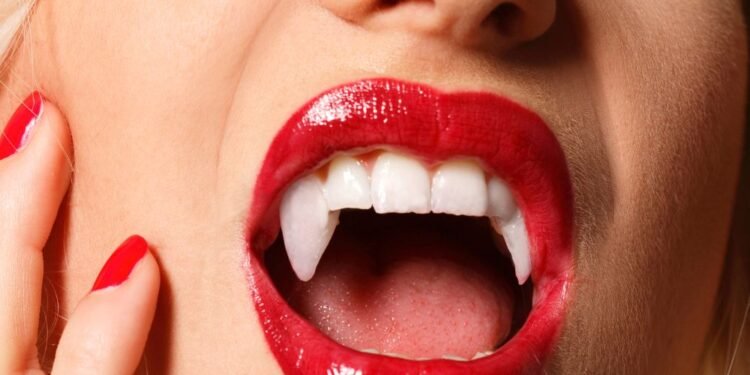Have you ever wondered about the query: Why are my teeth pointy? It’s not just a quirk of nature; several factors contribute to this dental trait. This comprehensive article will delve into the reasons behind pointed teeth and their implications for oral health and overall appearance.
Why Are My Teeth Pointy?
Pointed teeth can result from genetic, developmental, and environmental factors. Let’s explore these causes in detail:
1. Genetic Dental Traits
Genetics serves a significant role in shaping your teeth’ size, form, and alignment. Some genetic dental conditions that can lead to pointed teeth include:
- Peg-shaped laterals: Also known as “peg lateral incisors” or “fang teeth,” these are upper lateral incisors smaller and sharper than normal. They often resemble cones and can be rotated. This trait tends to run in families and is prevalent among individuals with Down syndrome
- Shovel-shaped incisors: These teeth, usually affecting the upper incisors, have a distinctive ridge along the back, giving them a shovel-like appearance. The cusps facing the palate are sharper and more pronounced. This trait is common among Mongoloid dental groups, especially in specific Asian populations, and can also be found in Native Americans
- Supernumerary teeth: Extra teeth growing in abnormal positions can resemble small pointed fangs. These supernumerary incisors are sometimes called “mesiodens” and are more common in individuals with genetic syndromes like cleft lip and palate
- Enamel hypoplasia: This condition results in underdeveloped, thin, soft, and translucent enamel, causing teeth to appear yellowish, pointed, and cone-like. Enamel hypoplasia can be caused by various factors, including birth injuries, premature birth, congenital disorders, and diseases affecting enamel formation
2. Childhood Factors
Apart from genetics, events during childhood can also influence dental development and lead to pointed teeth later in life:
- Malnutrition: Childhood malnutrition can affect enamel development, making teeth appear thin, translucent, and pointed. Deficiencies in vitamin D and calcium are particularly detrimental to dental health
- Fluorosis: Excessive fluoride consumption during enamel formation can result in subsurface porosity and staining, weakening teeth and causing them to wear down into pointed shapes
- Radiation therapy: Individuals who received radiation therapy to the jaw during childhood may experience enamel hypoplasia, shortened roots, and abnormally shaped or pointed permanent teeth
- Birth injuries: Rarely, trauma to a baby’s mouth during childbirth can damage developing tooth buds, leading to weaker, thinner, and pointed teeth
- Childhood oral habits: Long-term thumb-sucking, tongue-thrusting, or lip-sucking habits can exert excessive pressure on the front teeth, altering their natural rounding and causing them to appear bucked or conical
3. Adult Factors
Certain environmental factors and behaviors can gradually wear down regular adult teeth, transforming them into pointed peg shapes:
- Bruxism: Chronic teeth grinding can lead to accelerated wear and erosion, gradually changing the shape of back teeth from round to stubby pegs. Front teeth may also chip and flatten due to grinding
- Gum disease: Periodontal disease and gum infections cause gum recession and bone loss, exposing more of the tooth root. This can make previously short, blunt teeth appear longer, thinner, and pointed
- Acidic diets: Frequent consumption of acidic foods and drinks can erode enamel and intensify teeth tapering. Individuals with conditions like bulimia, who chronically purge acidic stomach contents, are at risk of rapidly eroding their teeth into sharp, splintered points
- Abrasion: Aggressive brushing, oral piercings brushing against teeth, and habits like nail-biting can accelerate wear and reshape teeth into sharp points over time. Some cultural practices involve intentional teeth chipping and filing to create sharp-pointed teeth
4. Normal Anatomical Variations
For some individuals, having slightly more pointed cusp tips or canine teeth is a natural variation within the normal range of tooth anatomy and not necessarily a cause for concern:
- Sharp canine teeth: Upper and lower canine teeth are naturally pointed for piercing and tearing food. These points may appear longer or sharper in some individuals, but they often reflect their inherited tooth shape
- High, sharp molar cusps: While back molar teeth typically have rounded cusps for chewing, some people inherit sharper, higher, and more pronounced cusp peaks that may resemble mini-fangs on their molars and premolars
Dental Treatments for Correcting Pointed Teeth
If pointed teeth are causing medical or social concerns, various dental treatments can effectively reshape and restore them for a more visually appealing and healthier smile:
- Tooth Reshaping (Odontoplasty): This involves filing or sanding down pointed edges to smooth out sharp tips, round high-pointed cusps, and re-contour teeth for a safer, blunter appearance
- Tooth Bonding: Dentists can apply composite resin material to mask jagged points or build up smaller, worn teeth to achieve a more rounded and natural appearance
- Dental Crowns: Custom-made caps can be placed over filed-down teeth, completely reshaping them into normal sizes and shapes, effectively concealing the pointed enamel
- Veneers: Thin laminates made of porcelain or composite materials can be adhered to the front of teeth, concealing underlying pointed or worn teeth with a smooth, rounded surface
Final Words: Why Are My Teeth Pointy?
With the wide array of cosmetic and restorative dental treatments available today, individuals with naturally pointed teeth can achieve a healthier, more normalized, and aesthetically pleasing smile. Don’t hesitate to consult your dentist if you have concerns about your pointed teeth.




